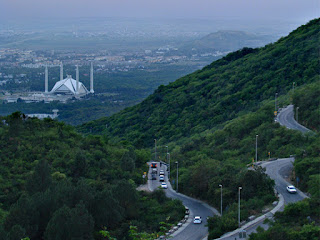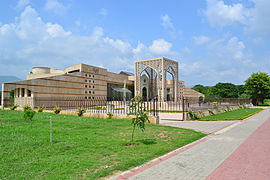 Islamabad is the capital city of Pakistan located within the federal Islamabad Capital Territory. With a population of two million, it is the 10th largest city of Pakistan, while the larger Islamabad-Rawalpindi metropolitan area is the third largest in Pakistan with a population exceeding five million.The city is the political seat of Pakistan and is administered by the Islamabad Metropolitan Corporation, supported by the Capital Development Authority (CDA).
Islamabad is the capital city of Pakistan located within the federal Islamabad Capital Territory. With a population of two million, it is the 10th largest city of Pakistan, while the larger Islamabad-Rawalpindi metropolitan area is the third largest in Pakistan with a population exceeding five million.The city is the political seat of Pakistan and is administered by the Islamabad Metropolitan Corporation, supported by the Capital Development Authority (CDA).
Islamabad is located in the Pothohar Plateau in the northeastern part of the country, between Rawalpindi District and the Margalla Hills National Park to the north. The region has historically been a part of the crossroads of Punjab and Khyber Pakhtunkhwa with the Margalla Pass acting as the gateway between the two regions.
 Islamabad was built during the 1960s to replace Karachi as Pakistan's capital. The city's master-plan divides the city into eight zones, including administrative, diplomatic enclave, residential areas, educational sectors, industrial sectors, commercial areas, and rural and green areas. The city is known for the presence of several parks and forests, including the Margalla Hills National Park and Shakarparian Park.The city is home to several landmarks, including the Faisal Mosque, the largest mosque in South Asia and the fourth largest in the world. Other landmarks include the Pakistan's National Monument and Democracy Square.
Islamabad was built during the 1960s to replace Karachi as Pakistan's capital. The city's master-plan divides the city into eight zones, including administrative, diplomatic enclave, residential areas, educational sectors, industrial sectors, commercial areas, and rural and green areas. The city is known for the presence of several parks and forests, including the Margalla Hills National Park and Shakarparian Park.The city is home to several landmarks, including the Faisal Mosque, the largest mosque in South Asia and the fourth largest in the world. Other landmarks include the Pakistan's National Monument and Democracy Square.
Islamabad is a beta- world city; it is categorised as very high on the Human Development Index, the highest in the country. The city has the highest cost of living in Pakistan, and its population is dominated by middle and upper middle class citizens.[14][15] The city is home to sixteen universities, including the Quaid-e-Azam University and NUST.The city is one of the safest in Pakistan, and has an expansive surveillance system with 1,900 CCTV cameras.
Etymology
The name of the city, Islamabad is derived from two words, Islam and abad, meaning "City of Islam". Islam is an Arabic word which refers to the religion of Islam and -abad is a Persian place name that means inhabited place or city.
Early History
Islamabad Capital Territory, located on the Pothohar Plateau of the Punjab region, is considered one of the earliest sites of human settlement in Asia. Some of the earliest Stone Age artefacts in the world have been found on the plateau, dating from 100,000 to 500,000 years ago. Rudimentary stones recovered from the terraces of the Soan River testify to the endeavours of early man in the inter-glacial period. Items of pottery and utensils dating back to prehistory have been found.
Early History
Islamabad Capital Territory, located on the Pothohar Plateau of the Punjab region, is considered one of the earliest sites of human settlement in Asia. Some of the earliest Stone Age artefacts in the world have been found on the plateau, dating from 100,000 to 500,000 years ago. Rudimentary stones recovered from the terraces of the Soan River testify to the endeavours of early man in the inter-glacial period. Items of pottery and utensils dating back to prehistory have been found.
Excavations have revealed evidence of a prehistoric culture. Relics and human skulls have been found dating back to 5000 BC that show this region was home to Neolithic people who settled on the banks of the Swaan River, who developed small communities in the region at around 3000 BC.One end of the Indus Valley Civilization flourished here between the 23rd and 18th centuries BC. Later the area was an early settlement of the Aryan community.[20] A Buddhist town once existed in the region. Many great armies such as those of Zahiruddin Babur, Genghis Khan, Timur and Ahmad Shah Durrani used the corridor through Islamabad on their way to invade the rest of the Indian Subcontinent. Modern Islamabad is based on the old settlement known as Saidpur. The British took control of the region from the Sikhs in 1849 and built South Asia's largest cantonment in the region.




No comments:
Post a Comment